词语替换
- 格式:docx
- 大小:26.57 KB
- 文档页数:2
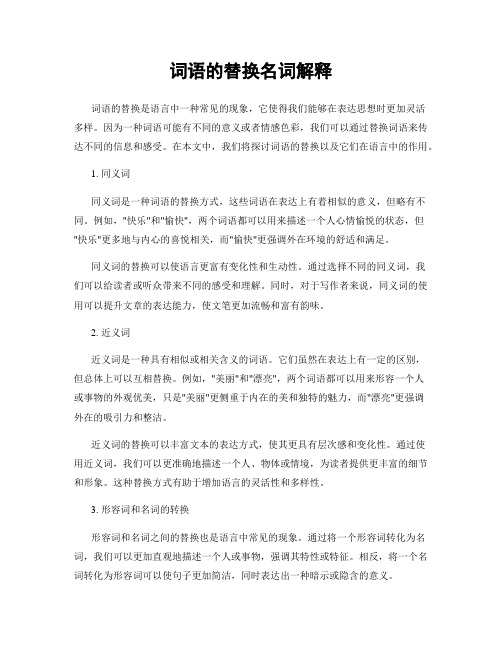
词语的替换名词解释词语的替换是语言中一种常见的现象,它使得我们能够在表达思想时更加灵活多样。
因为一种词语可能有不同的意义或者情感色彩,我们可以通过替换词语来传达不同的信息和感受。
在本文中,我们将探讨词语的替换以及它们在语言中的作用。
1. 同义词同义词是一种词语的替换方式,这些词语在表达上有着相似的意义,但略有不同。
例如,"快乐"和"愉快",两个词语都可以用来描述一个人心情愉悦的状态,但"快乐"更多地与内心的喜悦相关,而"愉快"更强调外在环境的舒适和满足。
同义词的替换可以使语言更富有变化性和生动性。
通过选择不同的同义词,我们可以给读者或听众带来不同的感受和理解。
同时,对于写作者来说,同义词的使用可以提升文章的表达能力,使文笔更加流畅和富有韵味。
2. 近义词近义词是一种具有相似或相关含义的词语。
它们虽然在表达上有一定的区别,但总体上可以互相替换。
例如,"美丽"和"漂亮",两个词语都可以用来形容一个人或事物的外观优美,只是"美丽"更侧重于内在的美和独特的魅力,而"漂亮"更强调外在的吸引力和整洁。
近义词的替换可以丰富文本的表达方式,使其更具有层次感和变化性。
通过使用近义词,我们可以更准确地描述一个人、物体或情境,为读者提供更丰富的细节和形象。
这种替换方式有助于增加语言的灵活性和多样性。
3. 形容词和名词的转换形容词和名词之间的替换也是语言中常见的现象。
通过将一个形容词转化为名词,我们可以更加直观地描述一个人或事物,强调其特性或特征。
相反,将一个名词转化为形容词可以使句子更加简洁,同时表达出一种暗示或隐含的意义。
例如,"脆弱"这个形容词可以替换为"脆弱性"这个名词,使得我们更加聚焦于脆弱这个特性的性质和本质。
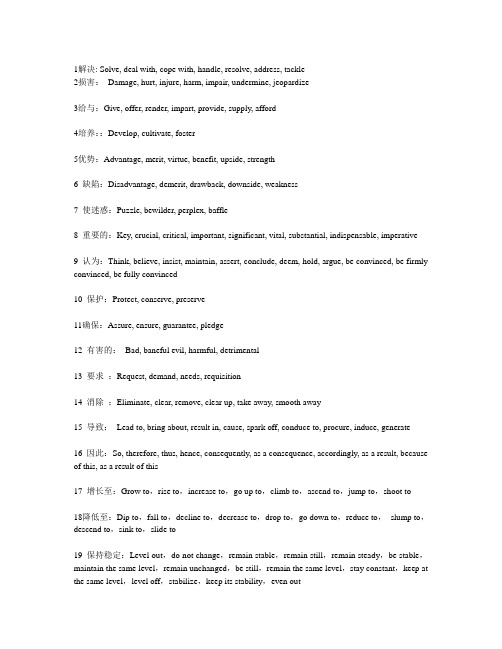
1解决: Solve, deal with, cope with, handle, resolve, address, tackle2损害:Damage, hurt, injure, harm, impair, undermine, jeopardize3给与:Give, offer, render, impart, provide, supply, afford4培养::Develop, cultivate, foster5优势:Advantage, merit, virtue, benefit, upside, strength6 缺陷:Disadvantage, demerit, drawback, downside, weakness7 使迷惑:Puzzle, bewilder, perplex, baffle8 重要的:Key, crucial, critical, important, significant, vital, substantial, indispensable, imperative9 认为:Think, believe, insist, maintain, assert, conclude, deem, hold, argue, be convinced, be firmly convinced, be fully convinced10 保护:Protect, conserve, preserve11确保:Assure, ensure, guarantee, pledge12 有害的:Bad, baneful evil, harmful, detrimental13 要求:Request, demand, needs, requisition14 消除:Eliminate, clear, remove, clear up, take away, smooth away15 导致:Lead to, bring about, result in, cause, spark off, conduce to, procure, induce, generate16 因此:So, therefore, thus, hence, consequently, as a consequence, accordingly, as a result, because of this, as a result of this17 增长至:Grow to,rise to,increase to,go up to,climb to,ascend to,jump to,shoot to18降低至:Dip to,fall to,decline to,decrease to,drop to,go down to,reduce to,slump to,descend to,sink to,slide to19 保持稳定:Level out,do not change,remain stable,remain still,remain steady,be stable,maintain the same level,remain unchanged,be still,remain the same level,stay constant,keep at the same level,level off,stabilize,keep its stability,even out20 急剧地:Dramatically,drastically,sharply,hugely,enormously,steeply,substantially,considerably,significantly,markedly,surprisingly,strikingly,radically,remarkably,vastly,noticeably21平稳地:Steadily,smoothly,slightly,slowly,marginally,gradually,moderately,mildly22 宣称:Allege, assert, declare, claim23 发生:Happen, occur, take place24 原因:Reason, factor, cause25 发展:Development, advance, progress26 有益的:Useful, helpful, beneficial, profitable, rewarding,advantageous27 影响:Influence, impact, effect28明显的:Clear, obvious, evident, self-evident, manifest, apparent, crystal-clear29占:Comprise, take up, account for, constitute, consist of, make up, occupy, hold, compose30与…相比:Compared with,compared to,in comparison with,in comparison to,by comparison with,by comparison to31对比而言:By contrast,in contrast,on the other hand,on the contrary=,conversely32展示:Show, reveal, illustrate, demonstrate, depict, present, represent, describe33 大约:Approximately,almost,about,around,nearly,roughly34波动:Fluctuate,go ups and downs,display a fluctuation,demonstrate a fluctuation35事实上:Practically,in practice,essentially,in essence,in reality,in effect,in fact,as a matter of fact,it is a fact that36 换言之:Namely,that is to say,in other words,to put it like this,to put it differently,to put it from another way,to put it from another angle.力拔山兮气盖世,时不利兮骓不逝。

词语替换①言语理解和表达的基础,用于训练语感;②近义/同义词的辨析【知识讲解】;③出现于长篇文章阅读中,不会单独出题。
词语替换的目的是考查应试者对语句中某一重要词语的理解能力:即应试者能够熟练而准确地运用同义词或者近义词来对句子中的重要词语进行替换。
出题方式通常是给定一个完整的句子,在该句子里比较重要的一个词下画一道横线,然后给出可供选择的四个同义词或近义词,选出一个与句意最为接近的词语来替换画线的词语。
解答词语替换这种题,首先需要应试者准确地理解句子的含义和画线词语的含义;其次要求准确分析所给词语的含义,从而选择出最符合句意的词。
[专家提示]一个原则:用所选定的词语替换画线之词语后,句子的含义基本一致。
基本要求:替换之后的句意与原句意一致,同时替换的词在整个句子中要协调,要符合原句的语境。
需要指出的是,近几年的考试题目中,词语替换题越来越少,未来的题目中也许不会有此类题目。
但词语替换作为言语理解与表达的一个基础,应试者还是应将这种题型的训练作为提高自己语感与理解能力的一个训练手段。
词语替换要求应试者能够准确迅速地理解考题中画线部分指定的词语,同时能够对所提供的四个选项进行区分,找出它们之间的相同语义和不同语义,然后迅速选定一个进行替换。
实例分析:*老张是一个非常诙谐的人。
只要有他在,大家总是乐呵呵的。
A.动人B.和谐C.风趣D.可爱解析:句中的“诙谐”一词主要是指老张这个人说话幽默,与“风趣”是同义词,因此两个词语可以互相替换。
*为了查清事实真相,掌握第一手材料,记者们又连夜采访了几位知情者。
A.拜访B.寻访C.访问D.走访解析:几个选项中都有“访问”的意思,但只有“走访”更符合原句中“采访”的原义,所以比较理想的答案是D。
*领导的心理是想让人尊重他,特别是在一些大众场合,领导者都很注重自己的形象。
A.崇拜B.敬仰C.佩服D.尊敬解析:在四个选项中,“崇拜”和“佩服”都不恰当,“敬仰”又有些太夸张,只有“尊敬”和“尊重”的意思最接近。

1. important =crucial (extremely important),significant(amount or effect large enough to be important)mon=universal, ubiquitous(if something is ubiquitous, it seems to be everywhere)3.abundant=ample(enough and usually extra), plentiful4.stick=adhere, cling(hold on something tightly)5.neglect=ignore.(difference: neglect means someone has not paid enough attention to something; ignore means no attention.)6.near=adjacent(twothings next to each other), adjoin(the same as adjacent)7.pursue=woo(man woos woman, old-fashioned), seek(if you seek sth, you try to obtain it. FORMAL)8.accurate=precise(precise is exact and accurate in all details), exact(correct in every detail)9.vague=obscure(unknown or known by only a few people)10.top=peak, summitpetitor=rival, opponent(especially in sports and politics)12.blame=condemn(if you condemn something, you say it is very bad and unacceptable)13.opinon=perspective, standpoint(means looking at an event or situation in a particular way)14.fame=prestige(describe those who are admired), reputation15.build=erect(you can erect something as buildings, FORMAL), establish16.insult=humiliate(do something or say something which makes people feel ashamed or stupid)plain=grumble (complain something in a bad-tempered way)18.primary=radical (very important and great in degree), fundamental19.relieve=alleviate (alleviate means you make pain or sufferings less intense or severe)20.force=coerces into(coerce means you make someone do something s/he does not want to),compel21.enlarge=magnify(magnify means make something larger than it really is)plex=intricate(if something is intricate, it often has many small parts and details)23. Lonely=solitary (if someone is solitary, there is no one near him/her)24.small=minuscule(very small), minute,25.praise=extol(stronger than praise), compliment(polite and political)26.hard-working=assiduous(someone who is assiduous works hard or does things very thoroughly)27.difficult=arduous (if something is arduous, it is difficult and tiring, and involves a lot of efforts)28.poor(soil)=barren, infertile(used to describe the soil is so poor that plants cannot be planted on it)29.fragile=brittle, vulnerable(someone who is vulnerable is easily hurt emotionally or physically)30.show=demonstrate (to demonstrate a fact means tp make it clear to people.)31.big=massive(large in size, quantity, or extent), colossal(use this word, you emphasize something’s large), tremendous(INFORMAL)32.avoid=shun(if someone shuns something, s/he deliberately avoid that something or keep away from it.)33.fair=impartial(someone who is impartial is able to give a fair opinion or decision on something.)34.attack=assault (physically attack someone), assail (attack violently)35.dislike=abhor(abhor means you hate something to a extreme extent for moral reasons), loathe(dislike very much)!36.ruin=devastate (it means damage something very badly, or utterly destroy it.)39.always=invariably(the same as always, but better than always)40.forever=perpetual(a perpetual state never changes), immutable(something immutable will never change or be changed)1.surprise=startle(it means surprise you slightly), astound(surprise you to a large degree),astonish(the same as astound)42.enthusiasm=zeal (a great enthusiasm), fervency (sincere and enthusiasm)43.quiet=tranquil(calm and peaceful), serene(calm and quiet)44.expensive=exorbitant(it means too expensive that it should be)45.luxurious=lavish(impressive and very expensive), sumptuous(grand and very expensive)46.boring=tedious(if you describe something tedious, you mean it is boring and frustrating)47.respect=esteem(if you esteem someone, you respect and admire him/her. FORMAL)48.worry=fret(if you fret about something, you worry about it)49.cold=chilly(unpleasantly cold), icy(extremely cold)50.hot=boiling(very hot)51.dangerous=perilous(very dangerous, hazardous(dangerous, especially to people's safety and health)52.nowadays=currently53.only=unique(the only one of its kind), distinctive;54.stop=cease(if something ceases, it stops happening or existing)55.part=component(the components of something are the parts that it is made of)56.result=consequence(the results or effects of something)57.obvious=apparent, manifest58.basedon=derived fromcan see or notice them very easily)60.quite=fairly61.pathetic=lamentable(very uncomfortable and disappointing)62.field=domain(a particular field of thought, activities or interest)63.appear=emerge(come into existence)64.whole=entire(the whole of something)65.wet=moist(slightly wet), damp(slightly wet), humid(very damp and hot)66.wrong=erroneous(incorrect or partly correct)67.difficult=formidable68.change=convert(change into another form)69.typical=quintessential(this word means represent a typical example of something)70.careful=cautious(very careful in order to avoid danger), prudent(careful and sensible)71.ability=capacity, capability(the same as ability)72.strange=eccentric(if some one is eccentric, s/he behaves in a strange way, or his/her opinion is different from most people)73.rich=affluent(if you are affluent, you have a lot of money)e= utilize (the same as use)75.dubious=skeptical(if you are skeptical about something, you have doubts on it.)76.satisfy=gratify (if you are gratified by something, it gives you pleasure and satisfaction)77.short=fleeting, ephemeral(if something is ephemeral, it lasts a short time)78.scholarship=fellowship79.angry=enraged(extremely angry)80.smelly=malodorous(used to describe an unpleasant smell)81.ugly=hideous(if something is hideous, it is very ugly or unattractive)82.attractive=appealing(pleasing and attractive), absorbing(something absorbing can attract you a great deal)83.diverse=miscellaneous(a miscellaneous groups consists of many different kinds of things)84.disorder=disarray, chaos85.crazily=frantically(used to describe someone who behaves in a wild and uncontrolled way)86.rapid=meteoric(ATTENTION: meteoric is only used to describe someone achieves success quickly)87.ordinary=mundane(very ordinary and not at interesting or unusual)88.despite=notwithstanding(FORMAL)89.best=optimal(used to describe the best level something can achieve)90.sharp=acute(severe and intense)91.unbelievable=inconceivable(if you deem something inconceivable, you think it very unlike to happen )92.puzzle=perplex(something perplex someone means it confuses and worries him/her because he/she does not understand it)93.method=avenue(away of getting something done)94.famous=distinguished(used to describe people who are successful in their career)95.ancient=archaic(extremely old and extremely old-fashioned)96.decorate=embellish(embellish means make something look more attractive via decorating it with something else)97.possible=feasible(if something is feasible, it can be done, made or achieved)98.so=consequently, accordingly99.rare=infrequent (doesn’t happen often)100.greedy=rapacious(greedy and selfish)。
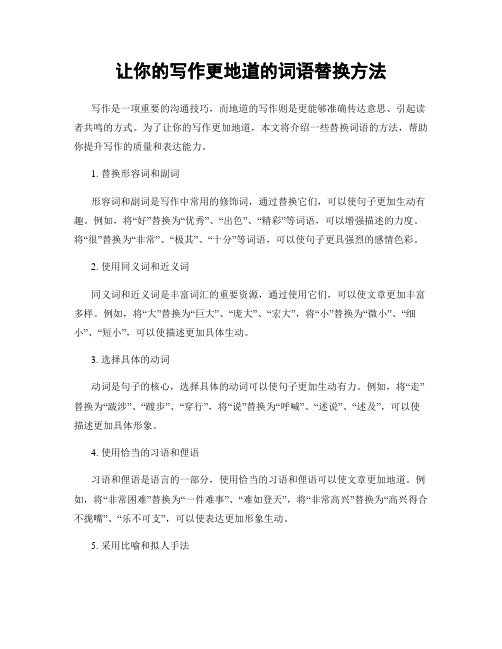
让你的写作更地道的词语替换方法写作是一项重要的沟通技巧,而地道的写作则是更能够准确传达意思、引起读者共鸣的方式。
为了让你的写作更加地道,本文将介绍一些替换词语的方法,帮助你提升写作的质量和表达能力。
1. 替换形容词和副词形容词和副词是写作中常用的修饰词,通过替换它们,可以使句子更加生动有趣。
例如,将“好”替换为“优秀”、“出色”、“精彩”等词语,可以增强描述的力度。
将“很”替换为“非常”、“极其”、“十分”等词语,可以使句子更具强烈的感情色彩。
2. 使用同义词和近义词同义词和近义词是丰富词汇的重要资源,通过使用它们,可以使文章更加丰富多样。
例如,将“大”替换为“巨大”、“庞大”、“宏大”,将“小”替换为“微小”、“细小”、“短小”,可以使描述更加具体生动。
3. 选择具体的动词动词是句子的核心,选择具体的动词可以使句子更加生动有力。
例如,将“走”替换为“跋涉”、“踱步”、“穿行”,将“说”替换为“呼喊”、“述说”、“述及”,可以使描述更加具体形象。
4. 使用恰当的习语和俚语习语和俚语是语言的一部分,使用恰当的习语和俚语可以使文章更加地道。
例如,将“非常困难”替换为“一件难事”、“难如登天”,将“非常高兴”替换为“高兴得合不拢嘴”、“乐不可支”,可以使表达更加形象生动。
5. 采用比喻和拟人手法比喻和拟人是修辞手法中常用的方法,通过使用比喻和拟人,可以使文章更加形象生动。
例如,将“太阳升起”替换为“太阳露出笑脸”,将“风吹树叶”替换为“风拂耳畔”,可以使描述更加有趣有味。
6. 使用具体的名词和名词短语名词是句子中的实词,使用具体的名词和名词短语可以使句子更加具体明确。
例如,将“东西”替换为“礼物”、“饭菜”、“书籍”,将“人们”替换为“学生”、“教师”、“工人”,可以使描述更加具体有力。
7. 采用丰富的连接词和过渡词连接词和过渡词是句子之间的桥梁,使用丰富的连接词和过渡词可以使文章的结构更加紧密有序。
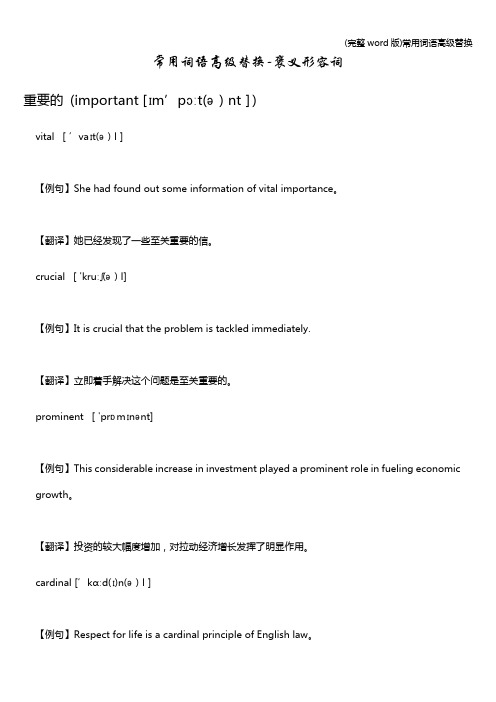
常用词语高级替换-褒义形容词重要的(important [ɪm’pɔːt(ə)nt])vital [’vaɪt(ə)l]【例句】She had found out some information of vital importance。
【翻译】她已经发现了一些至关重要的信。
crucial ['kruːʃ(ə)l]【例句】It is crucial that the problem is tackled immediately.【翻译】立即着手解决这个问题是至关重要的。
prominent ['prɒmɪnənt]【例句】This considerable increase in investment played a prominent role in fueling economic growth。
【翻译】投资的较大幅度增加,对拉动经济增长发挥了明显作用。
cardinal [’kɑːd(ɪ)n(ə)l]【例句】Respect for life is a cardinal principle of English law。
【翻译】尊重生命是英国法律最重要的原则.优秀的(good [gʊd])excellent [’eks(ə)l(ə)nt]【例句】She has always had a high reputation for her excellent short stories.【翻译】她一直因其优秀的短篇小说享有很高的声望。
outstanding [aʊt’stændɪŋ]【例句】The girl who won the scholarship was quite outstanding.【翻译】得奖学金的女孩是相当优秀的。
extraordinary [ɪkˈstrɔːdnri]【例句】Her strength of will was extraordinary。
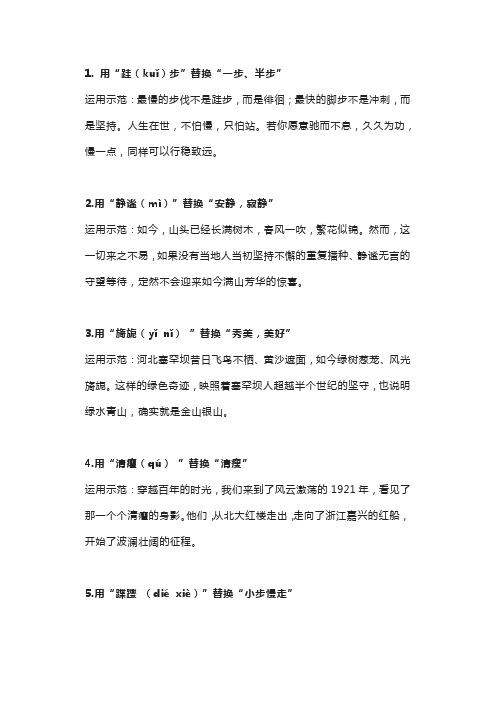
1.用“跬(kuǐ)步”替换“一步、半步”运用示范:最慢的步伐不是跬步,而是徘徊;最快的脚步不是冲刺,而是坚持。
人生在世,不怕慢,只怕站。
若你愿意驰而不息,久久为功,慢一点,同样可以行稳致远。
2.用“静谧(mì)”替换“安静,寂静”运用示范:如今,山头已经长满树木,春风一吹,繁花似锦。
然而,这一切来之不易,如果没有当地人当初坚持不懈的重复播种、静谧无言的守望等待,定然不会迎来如今满山芳华的惊喜。
3.用“旖旎(yǐnǐ)”替换“秀美,美好”运用示范:河北塞罕坝昔日飞鸟不栖、黄沙遮面,如今绿树葱茏、风光旖旎。
这样的绿色奇迹,映照着塞罕坝人超越半个世纪的坚守,也说明绿水青山,确实就是金山银山。
4.用“清癯(qú)”替换“清瘦”运用示范:穿越百年的时光,我们来到了风云激荡的1921年,看见了那一个个清癯的身影。
他们,从北大红楼走出,走向了浙江嘉兴的红船,开始了波澜壮阔的征程。
5.用“蹀躞(diéxiè)”替换“小步慢走”运用示范:“千般荒凉,以此为梦,万里蹀躞,以此为归。
”在余秋雨的眼中,文学道路即便荒凉,必须坚持走下去。
他将万里蹀躞,驰而不息,奔赴心之所向的迦南地。
6.用“迦南地”替换“希望之地,应许之地”运用示范:当年,摩西带领族人,走出埃及,沿着东方一路向前。
经过几十年的艰难跋涉,终于找到了流淌着奶和蜜的迦南地。
7.用“桑梓”替换“家乡,故乡”运用示范:桑梓之地,父母之邦,是我们永远难以忘记地方。
因此,不管我身处何地,都不会忘记一横长城长,一点茉莉香。
8.用“椿萱(chūn xuān)”替换“父母”运用示范:作为教学骨干,他在工作上兢兢业业,备受好评;作为家里的顶梁柱,他把一个家呵护得椿萱并茂,兰桂齐芳,令人赞叹!9.用“兰桂齐芳”替换“儿孙发达、孩子有出息”运用示范:虽然家道中落、无比困顿,但只要用心支撑,好好养育儿女,等将来兰桂齐芳,也会有家道复初的一天。
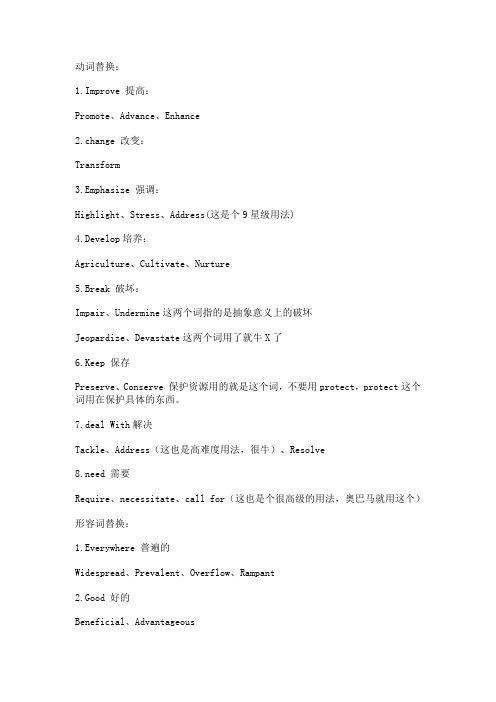
动词替换:1.Improve 提高:Promote、Advance、Enhance2.change 改变:Transform3.Emphasize 强调:Highlight、Stress、Address(这是个9星级用法)4.Develop培养:Agriculture、Cultivate、Nurture5.Break 破坏:Impair、Undermine这两个词指的是抽象意义上的破坏Jeopardize、Devastate这两个词用了就牛X了6.Keep 保存Preserve、Conserve 保护资源用的就是这个词,不要用protect,protect这个词用在保护具体的东西。
7.deal With解决Tackle、Address(这也是高难度用法,很牛)、Resolve8.need 需要Require、necessitate、call for(这也是个很高级的用法,奥巴马就用这个)形容词替换:1.Everywhere 普遍的Widespread、Prevalent、Overflow、Rampant2.Good 好的Beneficial、Advantageous3.Harmful 有害的Inhumane、Detrimental、Baneful4.Rich 富有的Wealthy、Affluent5.Poor 贫穷的Impoverished7.Serious 严重的Severe8.Obvious 明显的Manifest、Apparent、Evident9.cheap 便宜的Economical、Inexpensive名词替换:1.Forefather 祖先Ancestor、Predecessor2.Difference不同Gap(简单但是牛)、Distinction3.Crime 犯罪Delinquency、Criminal Act4.Environment 环境Circumstance、Atmosphere、Surrounding、Ambience 5.Pollution 污染Contamination6.Human 人类The human raceHumanityHumankind7.Danger 危险Peril、Hazard8.In modern society 在当今社会In contemporary societyIn present-day societyIn this day and age(这是最牛的说法)。
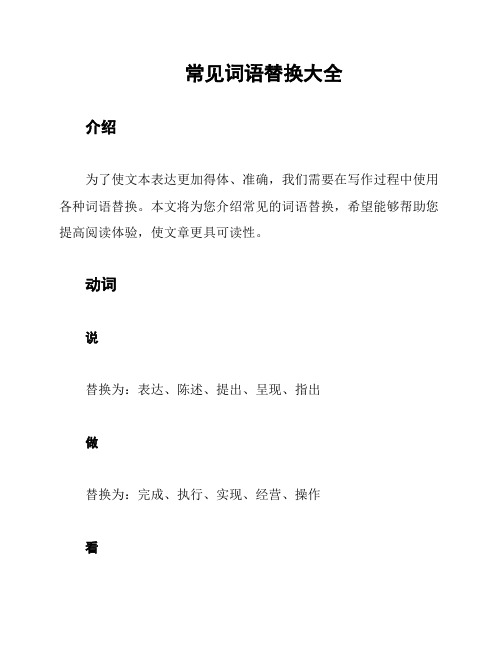
常见词语替换大全
介绍
为了使文本表达更加得体、准确,我们需要在写作过程中使用各种词语替换。
本文将为您介绍常见的词语替换,希望能够帮助您提高阅读体验,使文章更具可读性。
动词
说
替换为:表达、陈述、提出、呈现、指出
做
替换为:完成、执行、实现、经营、操作
看
替换为:观察、察看、瞥见、窥视、浏览明白
替换为:懂得、领会、了解、知晓、理解喜欢
替换为:爱好、钟爱、青睐、欣赏、喜爱名词
人
替换为:个人、民众、公众、职员、市民事情
替换为:事件、事项、事务、事态、情况
问题
替换为:难题、困境、疑问、难点、难处优点
替换为:优势、长处、益处、长项、优越性缺点
替换为:不足、欠缺、瑕疵、缺损、缺陷形容词
好
替换为:优秀、出色、精彩、正面、顶尖不好
替换为:糟糕、糟透、缺失、差劣、低劣
容易
替换为:轻松、简易、妥当、顺畅、安逸
困难
替换为:艰苦、艰难、费力、不易、难以
漂亮
替换为:美丽、绝色、秀丽、美观、动人
结论
以上就是常见词语替换的介绍,尽管词语替换可以让文章表达更加得体、准确,但过度替换也会影响文章的连贯度。
因此,在写作过程中请慎重使用词语替换,并根据具体情况使用适当的替换词语。
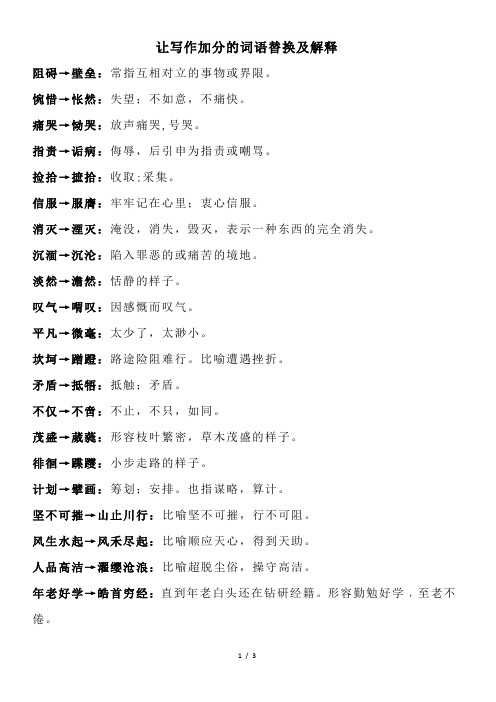
让写作加分的词语替换及解释阻碍→壁垒:常指互相对立的事物或界限。
惋惜→怅然:失望;不如意,不痛快。
痛哭→恸哭:放声痛哭,号哭。
指责→诟病:侮辱,后引申为指责或嘲骂。
捡拾→摭拾:收取;采集。
信服→服膺:牢牢记在心里;衷心信服。
消灭→湮灭:淹没,消失,毁灭,表示一种东西的完全消失。
沉湎→沉沦:陷入罪恶的或痛苦的境地。
淡然→澹然:恬静的样子。
叹气→喟叹:因感慨而叹气。
平凡→微毫:太少了,太渺小。
坎坷→蹭蹬:路途险阻难行。
比喻遭遇挫折。
矛盾→抵牾:抵触;矛盾。
不仅→不啻:不止,不只,如同。
茂盛→葳蕤:形容枝叶繁密,草木茂盛的样子。
徘徊→蹀躞:小步走路的样子。
计划→擘画:筹划;安排。
也指谋略,算计。
坚不可摧→山止川行:比喻坚不可摧,行不可阻。
风生水起→风禾尽起:比喻顺应天心,得到天助。
人品高洁→濯缨沧浪:比喻超脱尘俗,操守高洁。
年老好学→皓首穷经:直到年老白头还在钻研经籍。
形容勤勉好学﹐至老不倦。
春华吐艳→寒木春华:指寒木不凋、春花吐艳。
比喻各有所长。
放眼当下→揆诸当下:思考现在这一时刻。
秋天大海→秋空霁海:秋天的天空和平静的海波。
光照万物→霁虹日晞:雨停了,天空放晴了,太阳光照耀晒干了刚被雨水湿润的万物。
岁月变迁→星燧贸迁:比喻岁月变迁。
满腔赤诚→披沥赤忱:指表露非常真诚的心意。
美好言行→嘉言懿行:美好的言行。
漂泊不定→浪萍风梗:浪中之浮萍,风中之断梗。
形容人漂泊不定。
飘忽如梦→流绪微梦:是指一种轻忽飘渺的情感,就好像流动的思绪,细微的梦。
嫁祸于人→以邻为壑:比喻只顾自己的利益,把困难、灾祸等转嫁给别人。
不值一提→不值一哂:不值得一笑。
比喻毫无价值。
未雨绸缪→曲突徙薪:比喻消除可能导致事故发生的因素,防患于未然。
广受好评→口碑载道:群众的称颂一路上都能听得到。
形容到处受人称赞。
消除误会→涣然冰释:消失得像冰块消融一样。
比喻疑虑、误会、隔阂完全消除。
所言极是→斯言灼灼:形容人们说话有条理,有底气。
举一反三→一隅三反:从一件事物的情况、道理类推而知道许多事物的情况、道理。
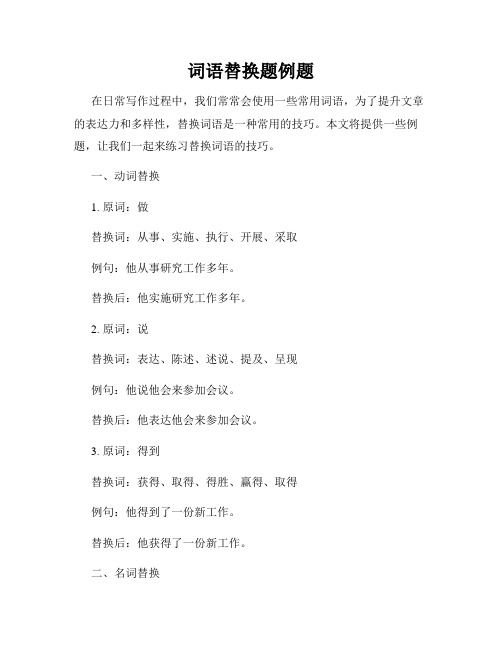
词语替换题例题在日常写作过程中,我们常常会使用一些常用词语,为了提升文章的表达力和多样性,替换词语是一种常用的技巧。
本文将提供一些例题,让我们一起来练习替换词语的技巧。
一、动词替换1. 原词:做替换词:从事、实施、执行、开展、采取例句:他从事研究工作多年。
替换后:他实施研究工作多年。
2. 原词:说替换词:表达、陈述、述说、提及、呈现例句:他说他会来参加会议。
替换后:他表达他会来参加会议。
3. 原词:得到替换词:获得、取得、得胜、赢得、取得例句:他得到了一份新工作。
替换后:他获得了一份新工作。
二、名词替换替换词:工作、活动、事件、事务、任务例句:我有很多事情要处理。
替换后:我有很多工作要处理。
2. 原词:人替换词:个体、人士、公民、成员、伙伴例句:这个城市有很多人。
替换后:这个城市有很多公民。
3. 原词:问题替换词:难题、困扰、挑战、疑问、难点例句:这个问题很难解决。
替换后:这个难题很难解决。
三、形容词替换1. 原词:好替换词:优秀、出色、棒、很棒、杰出例句:他的表现很好。
替换后:他的表现很棒。
替换词:糟糕、糟、差、不好、逊例句:这件事情的结果很坏。
替换后:这件事情的结果很糟糕。
3. 原词:大替换词:巨大、庞大、宏大、广大、巨额例句:这个城市的面积很大。
替换后:这个城市的面积很广大。
四、副词替换1. 原词:非常替换词:极其、十分、异常、特别、相当例句:他非常喜欢这个游戏。
替换后:他特别喜欢这个游戏。
2. 原词:迅速替换词:快速、飞快、敏捷、迅猛、疾速例句:他迅速逃跑了。
替换后:他飞快逃跑了。
替换词:彻底、全部、全面、全然、十足例句:这个计划完全失败了。
替换后:这个计划彻底失败了。
五、连词替换1. 原词:并且替换词:而且、同时、此外、另外、且例句:他爱吃水果,并且喜欢运动。
替换后:他爱吃水果且喜欢运动。
2. 原词:所以替换词:因此、因而、于是、故此、综上所述例句:他很努力,所以成功了。
替换后:他很努力,因此成功了。
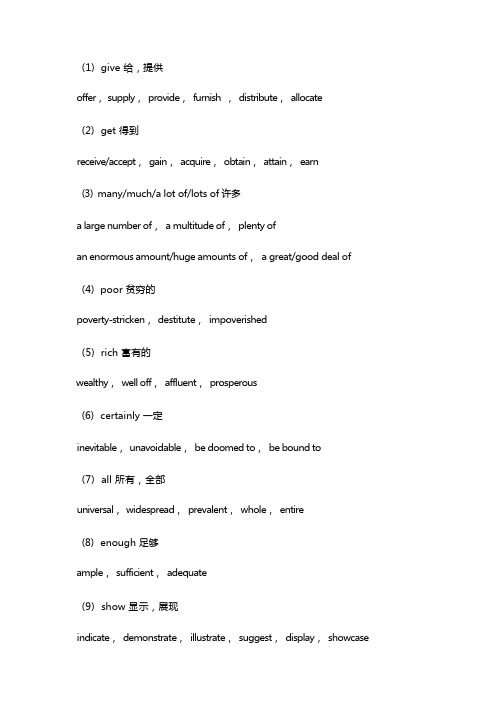
(1) give 给,提供offer, supply, provide, furnish , distribute, allocate(2) get 得到receive/accept, gain, acquire, obtain, attain, earn(3) many/much/a lot of/lots of 许多a large number of, a multitude of, plenty ofan enormous amount/huge amounts of, a great/good deal of (4) poor 贫穷的poverty-stricken, destitute, impoverished(5) rich 富有的wealthy, well off, affluent, prosperous(6) certainly 一定inevitable, unavoidable, be doomed to, be bound to(7) all 所有,全部universal, widespread, prevalent, whole, entire(8) enough 足够ample, sufficient, adequate(9) show 显示,展现indicate, demonstrate, illustrate, suggest, display, showcase(10) risk/danger 危险hazard, peril, jeopardize, endanger, menace(11) way 方法,办法,手段measure, method, means, approach(12) catch, attractive 吸引,有吸引力的obsess, immerse, fascinate, enchantcharming, inviting, alluring, appealing(13) harm/damage 破坏(的),有害(的)destructive, devastating, detrimental, undermine(14) useful/helpful 有用的effective, practical, valuable, invaluable, conducive(15) great/wonderful 伟大的incredible, amazing, sublime, extraordinary, magnificent, glorious (16) try, effort 努力endeavor, strive to do sth/for sth(17) famous 著名的well-known, celebrated, noted, eminent, renowned(18) difficulty 困难,困境adversity, hardship, plight, predicamentsetback, hurdle, obstacle(19) focus on 集中center on, concentrate on(20) so 所以consequently, therefore, as a result (21) because 因为as a result of; attribute/ascribe A to B (22) press(ure)压力place/put a (heavy) burden on; strain (23) about 大约approximately, roughly(24) cooperate 合作Collaborate, join hands in doing sth (25) waste 浪费(的) Squander, fritter, luxurious (26) save/economical 节约(的) Thrifty, conserve(27) develop 发展Thrive, evolve, burgeon(28) promote 促进Boost, give a boost to, accelerate (29) delay, postpone 暂缓,延期shelve(30) deal with 应对,处理Cope with, grapple with, address, tackle。
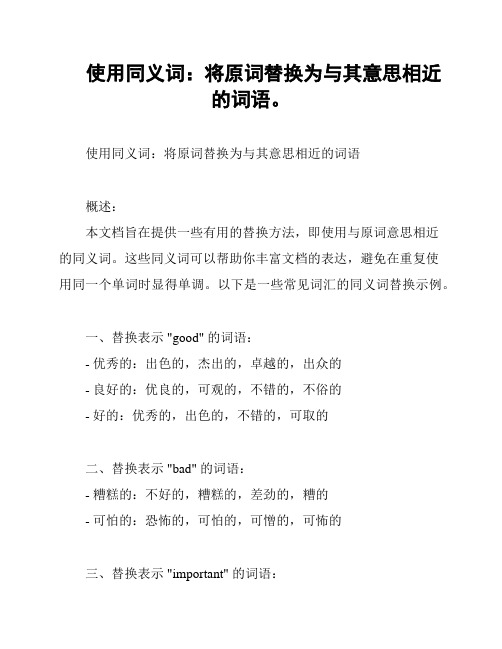
使用同义词:将原词替换为与其意思相近
的词语。
使用同义词:将原词替换为与其意思相近的词语
概述:
本文档旨在提供一些有用的替换方法,即使用与原词意思相近
的同义词。
这些同义词可以帮助你丰富文档的表达,避免在重复使
用同一个单词时显得单调。
以下是一些常见词汇的同义词替换示例。
一、替换表示 "good" 的词语:
- 优秀的:出色的,杰出的,卓越的,出众的
- 良好的:优良的,可观的,不错的,不俗的
- 好的:优秀的,出色的,不错的,可取的
二、替换表示 "bad" 的词语:
- 糟糕的:不好的,糟糕的,差劲的,糟的
- 可怕的:恐怖的,可怕的,可憎的,可怖的
三、替换表示 "important" 的词语:
- 重要的:重大的,关键的,要紧的,重要的
- 重要性:重大性,重要性,关键性
- 紧要的:迫切的,紧迫的,紧急的
四、替换表示 "interesting" 的词语:
- 有趣的:有意思的,有趣的,有吸引力的,引人入胜的
- 有趣性:趣味性,有趣性,吸引力
五、替换表示 "difficult" 的词语:
- 困难的:艰难的,费力的,费劲的,难题的,难以应付的
六、替换表示 "easy" 的词语:
- 容易的:简单的,轻松的,易于,方便的
总结:
使用同义词替换可以提高文档的可读性和多样性,并避免重复使用某些词汇。
当进行同义词替换时,需要考虑上下文的合理性和准确性。
希望本文档能对你在写作中使用同义词有所帮助。

1. 贫穷的:poor = needy = impoverished = poverty-stricken2. 富裕的:rich = wealthy = affluent = well-to-do = well-off3. 优秀的:excellent = eminent = top = outstanding4. 积极的,好的:good = conducive = beneficial=advantageous5. 消极的,不良的:bad = detrimental= baneful =undesirable6. 明显的:obvious = apparent = evident =manifest7. 健康的: healthy = robust = sound = wholesome8. 惊人的:surprising = amazing = extraordinary = miraculous9. 美丽的:beautiful = attractive = gorgeous = eye-catching10. 有活力的:energetic = dynamic = vigorous =animated11. 流行的:popular = prevailing = prevalent= pervasive★动词:1. 提高,加强:improve = enhance= promote = strengthen = optimize2. 引起:cause = trigger = endanger3. 解决:solve =resolve =address = tackle =cope with = deal with4. 拆除:destroy = tear down = knock down = eradicate5. 培养: develop = cultivate = foster = nurture6. 激发,鼓励:encourage = motivate = stimulate = spur7. 认为:think = assert= hold = claim = argue8. 完成:complete = fulfill = accomplish= achieve9. 保留:keep = preserve = retain = hold10. 有害于:destroy = impair = undermine = jeopardize11. 减轻: ease = alleviate = relieve = lighten★名词:1. 影响:influence= impact2. 危险:danger = perils =hazard3. 污染:pollution = contamination4. 人类:human beings= mankind = human race5. 老人:old people= the old = the elderly = the aged = senior citizens6. 幸福:happiness = cheerfulness = well-being7. 老师:teachers = instructors = educators = lecturers8. 教育:education = schooling = family parenting = upbringing9. 青少年:young people = youngsters = youths = adolescents10. 优点:advantage = merits = superiority = virtue11. 责任:responsibility = obligation = duty = liability12. 能力:ability = capacity = power = skill13. 职业:job = career = employment = profession14. 娱乐:enjoyment = pastimes = recreation= entertainment15. 孩子:children = offspring = descendant= kid1. 充满了:be filled with = be awash with = be inundate with = be saturated with2. 努力:struggle for = aspire after = strive for = spare no efforts for3. 从事:embark on = take up = set about = go in for4. 在当代: in contemporarysociety = in present-day society= in this day and age5. 大量的: a host of = a multitude of = a vast number of = a vast amount of。

四六级写作常用词语高级替换1. 勇敢的(brave)bold [bəʊld]【例句】He believes that students should be encouraged to experiment with bold ideas.【翻译】他认为应该鼓励学生们将大胆的观念付诸试验。
courageous [kə'reɪdʒəs]【例句】It was a very frightening experience and they were very courageous.【翻译】那是一次让人胆战心惊的经历,而他们表现得非常勇敢。
fearless ['fɪəlɪs]【例句】The soldiers followed their fearless leader into the battle.【翻译】士兵们随着他们勇敢的指挥官投入战斗。
2. 著名的(famous)noticeable ['nəʊtɪsəb(ə)l]【例句】There's also been a noticeable rise in the political temperature.【翻译】政治气氛也明显升温了。
renowned [rɪ'naʊnd]【例句】M r. Brooke is renowned for his dry wit.【翻译】布鲁克先生因他不露声色的机智而闻名。
notable ['nəʊtəb(ə)l]【例句】Several notable researchers are studying the effects of hyperventilation. 【翻译】几位著名的研究人员正在研究通气过度的后果。
3. 许多(many)a host of [həʊst]【例句】The new e-books will include a host of Rough Guide titles.【翻译】新电子书将包括大量的简明指南。
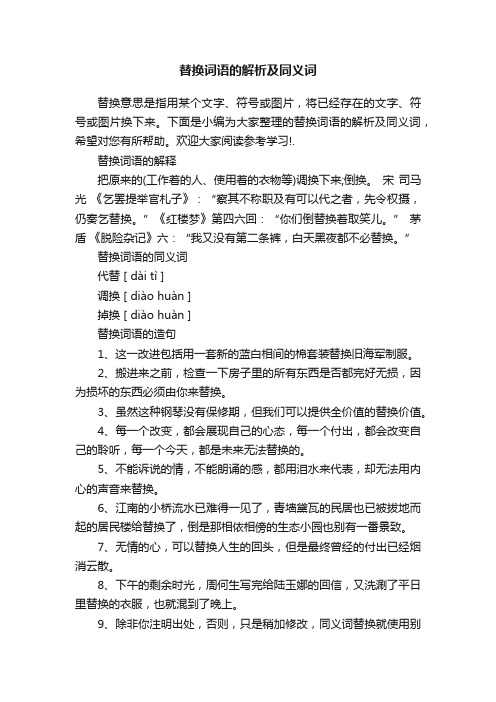
替换词语的解析及同义词替换意思是指用某个文字、符号或图片,将已经存在的文字、符号或图片换下来。
下面是小编为大家整理的替换词语的解析及同义词,希望对您有所帮助。
欢迎大家阅读参考学习!.替换词语的解释把原来的(工作着的人、使用着的衣物等)调换下来;倒换。
宋司马光《乞罢提举官札子》:“察其不称职及有可以代之者,先令权摄,仍奏乞替换。
”《红楼梦》第四六回:“你们倒替换着取笑儿。
” 茅盾《脱险杂记》六:“我又没有第二条裤,白天黑夜都不必替换。
”替换词语的同义词代替[ dài tì ]调换[ diào huàn ]掉换[ diào huàn ]替换词语的造句1、这一改进包括用一套新的蓝白相间的棉套装替换旧海军制服。
2、搬进来之前,检查一下房子里的所有东西是否都完好无损,因为损坏的东西必须由你来替换。
3、虽然这种钢琴没有保修期,但我们可以提供全价值的替换价值。
4、每一个改变,都会展现自己的心态,每一个付出,都会改变自己的聆听,每一个今天,都是未来无法替换的。
5、不能诉说的情,不能朗诵的感,都用泪水来代表,却无法用内心的声音来替换。
6、江南的小桥流水已难得一见了,青墙黛瓦的民居也已被拔地而起的居民楼给替换了,倒是那相依相傍的生态小园也别有一番景致。
7、无情的心,可以替换人生的回头,但是最终曾经的付出已经烟消云散。
8、下午的剩余时光,周何生写完给陆玉娜的回信,又洗涮了平日里替换的衣服,也就混到了晚上。
9、除非你注明出处,否则,只是稍加修改,同义词替换就使用别人的句子也是剽窃。
10、早已养精蓄锐多时的一营迅速替换下二营,生龙活虎地扑向敌人。
11、思意苦乐却为尘埃,星辰替换变的是时间,不变却为定格的世界。
12、三万年中,他的臣民像松柏完全不受针叶替换影响一样。
13、结果与对照组比较,保留二尖瓣装置的二尖瓣替换术后心功能恢复更好。
14、三年任满将替换,华人蛮族数千人赴衙门请为卢钧立生祠,刻功颂德。
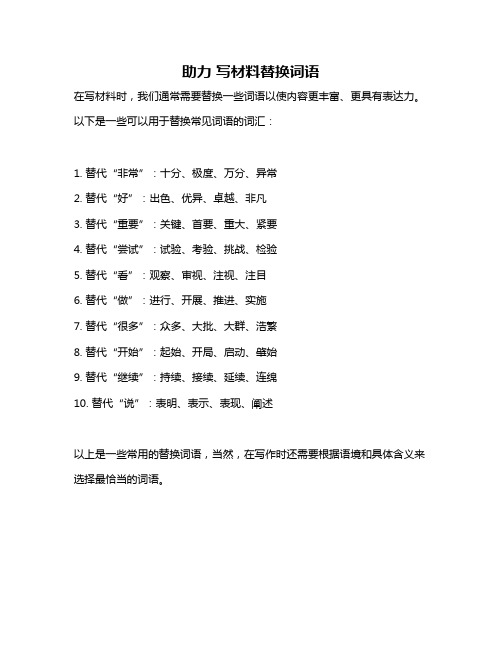
助力写材料替换词语
在写材料时,我们通常需要替换一些词语以使内容更丰富、更具有表达力。
以下是一些可以用于替换常见词语的词汇:
1. 替代“非常”:十分、极度、万分、异常
2. 替代“好”:出色、优异、卓越、非凡
3. 替代“重要”:关键、首要、重大、紧要
4. 替代“尝试”:试验、考验、挑战、检验
5. 替代“看”:观察、审视、注视、注目
6. 替代“做”:进行、开展、推进、实施
7. 替代“很多”:众多、大批、大群、浩繁
8. 替代“开始”:起始、开局、启动、肇始
9. 替代“继续”:持续、接续、延续、连绵
10. 替代“说”:表明、表示、表现、阐述
以上是一些常用的替换词语,当然,在写作时还需要根据语境和具体含义来选择最恰当的词语。
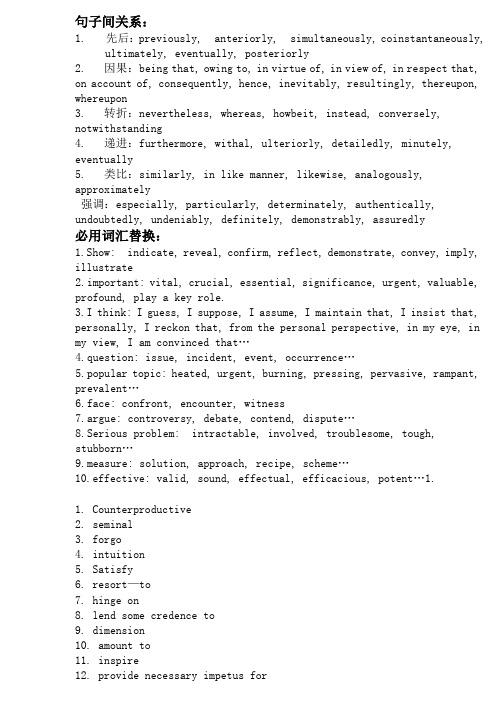
句子间关系:1.先后:previously, anteriorly, simultaneously, coinstantaneously,ultimately, eventually, posteriorly2.因果:being that, owing to, in virtue of, in view of, in respect that, on account of, consequently, hence, inevitably, resultingly, thereupon, whereupon3.转折:nevertheless, whereas, howbeit, instead, conversely, notwithstanding4.递进:furthermore, withal, ulteriorly, detailedly, minutely, eventually5.类比:similarly, in like manner, likewise, analogously, approximately强调:especially, particularly, determinately, authentically, undoubtedly, undeniably, definitely, demonstrably, assuredly必用词汇替换:1.Show: indicate, reveal, confirm, reflect, demonstrate, convey, imply, illustrate2.important: vital, crucial, essential, significance, urgent, valuable, profound, play a key role.3.I think: I guess, I suppose, I assume, I maintain that, I insist that, personally, I reckon that, from the personal perspective, in my eye, in my view, I am convinced that…4.question: issue, incident, event, occurrence…5.popular topic: heated, urgent, burning, pressing, pervasive, rampant, prevalent…6.face: confront, encounter, witness7.argue: controversy, debate, contend, dispute…8.Serious problem: intractable, involved, troublesome, tough, stubborn…9.measure: solution, approach, re cipe, scheme…10.effective: valid, sound, effectual, efficacious, potent…1.1. Counterproductive2. seminal3. forgo4. intuition5. Satisfy6. resort—to7. hinge on8. lend some credence to9. dimension10. amount to11. inspire12. provide necessary impetus for13. obscure14. paradigm15. nascent16. irrespective of whether17. catalyst18. draw a distinction between19. proviso20. proceeding21. thwart22. unprecedented23. inexorable24.take precedence over25. serve as a substitute for/ be superseded by26. emerge from27. celebrity/ elite/ personality/ notable figure28. prevailing29. instill/ inculcate/ impart/ foster/ nurture30. eliminate/ diminish/ undermine31. Exacerbate32. Exorbitant/ undue/ overextended33. Pose/ render/ breed/ burgeon/ outgrowth34. Seek to/ strive to/ probe35. Subsidize/ patron/ on the patronage of/ under the auspices of36. Escalate/ enhance/ promote/ augment/ elevate因果类:3.18.19.21.22.28.29.32.41.42.45.50.59.74.75.78.79.80.89.90.94.96.100. 101.103.112.130.134.135.136.137.138.141.142.143.144.147.155.158.160.1 79.184.185.188.196.199.200.210.211.217.219.225.231.233.234建议类:6.7.9.12.20.23.24.25.26.30.33.36.39.40.43.47.49.52.54.57.58.60.62.63.66.70.76.81.86.92.115.119.129.133.140.149.150.154.170.171.178.182.183 186.189.191.193.194.197.198.205.207.208.209.222.228.229.230.235.237.2 38.241.243.244.是非类:4.13.15.31.37.48.53.72.97.98.99.109.139.162.165.204.216.220.221.226. 227.232.定义类: 10.82.125.132.153.181.201.事实类:1.2.5.11.16.27.34.35.38.46.51.55.56.61.64.65.67.68.69.71.73.83.85.87.88.91.93.95.102.104.105.106.107.111.113.114.116.117.118.1 20.121.122.124.126.128.131.145.148.151.152.156.157.159.161.163.164.16 6.167.168.169.172.173.174.176.177.180.187.190.192.195.203.206.214.215 .218.223. 236.239.240.242.社会:2.3.9.13.16.20.21.26.27.38.41.45.50.52.56.57.69.73.93.100.106.113.120 122.129.132.140.150.151.154.158.160.165.173.178.183.200.222.224.227 . 233.239.240.241.243.244.行为:1.5.7.11.15.17.42.44.48.51.54.55.61.64.66.67.71.75.79.98.101.107. 116.117.119.121.125.126.128.136.137.142.143.145.148.155.162.164.166.1 67.168.172.174.179.186.188.189.190.191.192.196.205.206.211.214.215.21 6.218.219.220.236.242.教育:12.14.19.30.31.32.33.35.47.58.60.70.74.78.80.82.84.86.92.108.110.112.114.133.134.171.181.193.194.202.203.208.210.212.229科技:10.46.49.68.87.94.95.99.104.109.115.130.131.135.139.146.176.199.213.2 17. 233.学习:8.22.37.39.53.72.102.118.144.157.159.160.161.163.180.184.197.209.225. 228.238政治: 4.23.24.25.36.59.63.65.77.85.88.103.147.149.175.182.204.232文化: 29.43.127.152.153.156.187.207.221.230.234艺术: 62.76.81.111.123.124.138.170.198.223历史: 6.28.34.83.90.105.169.201国际: 96.177.185.235.237.传媒: 18.40.89.91.141.195。
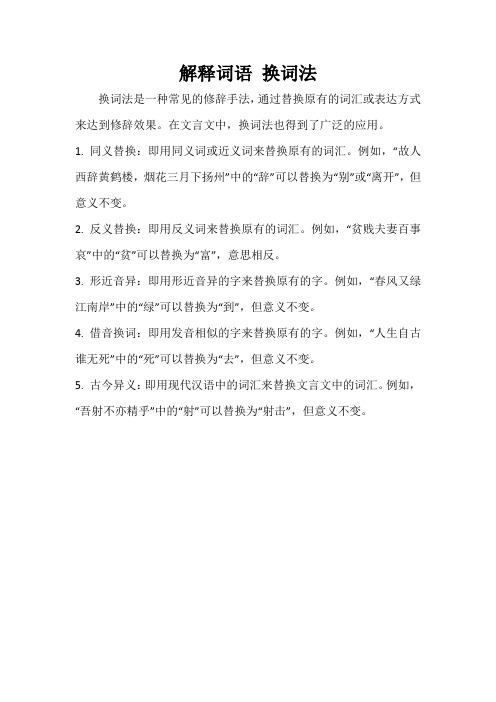
解释词语换词法
换词法是一种常见的修辞手法,通过替换原有的词汇或表达方式来达到修辞效果。
在文言文中,换词法也得到了广泛的应用。
1. 同义替换:即用同义词或近义词来替换原有的词汇。
例如,“故人西辞黄鹤楼,烟花三月下扬州”中的“辞”可以替换为“别”或“离开”,但意义不变。
2. 反义替换:即用反义词来替换原有的词汇。
例如,“贫贱夫妻百事哀”中的“贫”可以替换为“富”,意思相反。
3. 形近音异:即用形近音异的字来替换原有的字。
例如,“春风又绿江南岸”中的“绿”可以替换为“到”,但意义不变。
4. 借音换词:即用发音相似的字来替换原有的字。
例如,“人生自古谁无死”中的“死”可以替换为“去”,但意义不变。
5. 古今异义:即用现代汉语中的词汇来替换文言文中的词汇。
例如,“吾射不亦精乎”中的“射”可以替换为“射击”,但意义不变。
词语替换Unit1选择适当的词语替换句中划线部分。
1. There is an interesting program on TV this evening.A.showB. activityC. subject2. Take the medicine once every eight hours. I’m sure you’ll be well soon.A. twice a dayB. three times a dayC. four times a day3.—May I use your eraser?—Of course, you can.A. That isB. I seeC. Sure4. It’s eight o’clock now. I must go home.A. canB. have toC. would5. Tony is pretty healthy because he exercises every day.A. does sportsB. goes shoppingC. does homeworkUnit2选择适当的词语替换句中划线部分。
1. ---What’s the matter with you?---I have a sore throat.A. wrongB. the wrongC. right2. Mary got better after her illness.A. hadB. becameC. made3. Could you wait a moment, please?A. a long timeB. a short timeC. too late4. I want to buy a few pens from the store.A. a lot ofB. someC. many5. Please give me some advice on my birthday party.A. suggestionsB.funC. programsUnit3选择适当的词语替换句中划线部分。
1.—Mary is going to Shanghai for vacation. How aboutyou, Linda?—I’m going to Beijing.A. How areB. What aboutC. Why not2. Can I ask you some questions about it?A. MayB. MustC. Need3. I’m feeling a lot better today.A. lots ofB. muchC. many4. She had to babysit her little brother at home yesterday.A. look forB. look afterC. look at5. He will get back next weekend.A. leave forB. go awayC. come back Unit4选择适当的词语替换句中划线部分。
1. When can the students come back from the school trip?A. go homeB. leave forC. get back2. When did your father arrive in Beijing yesterday?A. arrive atB. get toC. get in3. You should have a look at your map or ask others for help.A. look atB. look afterC. look for4. My father leaves for work at about six thirty every morning.A. overB. aroundC. on5. A number of student in our school are from the countryside.A. ManyB. MuchC. MostUnit5选择适当的词语替换句中划线部分。
1. My sister has piano lesson every week.A. classB. testC. invitation2. ---What did Vince do yesterday morning?---He played basketball the whole morning.A. every morningB. all the morningC. all the day3. Kay didn’t learn to surf the Internet till she was ten years old.A. afterB. butC. until4. ---Jeff can you play tennis with me after class?---I’m sorry. I have to go to see the dentist.A. mustB. mayC. can5. ---Can you go to the movies with me on Sunday?---Sure, I’d love to.A. go to schoolB. go to bedC. go to watch the moviesUnit6选择适当的词语替换句中划线部分。
1. Tina and I are the same in some ways. For example, we both like music.A. both usB. both of usC. both of we2. There are over 3,000 students in my school.A. less thanB. more thanC. much more3. His shoes are the same size as mine.A. as big asB. not so big asC. bigger than4. Lucy does well in dancing and she will dance at the party tomorrow.A. is weak inB. knows nothing aboutC. is good at5. I like this article very much because it is interesting.A. scaryB. difficultC. funnyUnit7选择适当的词语替换句中划线部分。
1. Finally Mr. Smith finished the dinner by himself.A. At lastB. LastC. Next2. I often visit my grandparents with fruits on weekends.A. look afterB. go to seeC. telephone3. There are more than twelve students in the restaurant now.A. too muchB. overC. around4. Lucy sat before Lisa in the dining room.A. behindB. next toC. in front of5. When it was my time to speak, I can’t be calm.A. turnB. nameC. momentUnit8选择适当的词语替换句中划线部分。
1. I ate a hamburger and some ice cream this afternoon.A. gotB. tookC. had2. I think the food in the restaurant is terrible.A. cuteB. awfulC. serious3. We enjoyed ourselves at the aquarium yesterday.A. are happyB. felt greatC. had fun4. It rained all day last Sunday. We had to stay at home and watched DVDS.A. whole dayB. the whole dayC. the all day5. In the end he decided to send the sick boy to hospital.A. At lastB. At onceC. At firstUnit9选择适当的词语替换句中划线部分。
1. We are touring Thailand this winter vacation.A. goingB. campingC. visiting2. They all had to take part in the running training this morning.A. take a walkB. take a photoC. join in3. The weather became cooler than before.A. cameB. gotC. made4. Mr. Hand named his daughter Kay.A. calledB. gaveC. meant5. Li Yundi is a well-known Chinese pianist.A. famousB. unusualC. outstandingUnit10选择适当的词语替换句中划线部分。
1. We can’t stand the humid climate there.A. warmB. wetC. cold2. I would like to spend my vacation in Dalian once more.A. againB. tooC. another3. ---What do you think of the film?---It’s interesting.A. boringB. funnyC. fantastic4. Doing exercise every day can make you stay healthy.A. liveB. becomeC. keep5. What was the weather like in Beijing?A. HowB. WhenC. WhichUnit11选择适当的词语替换句中划线部分。